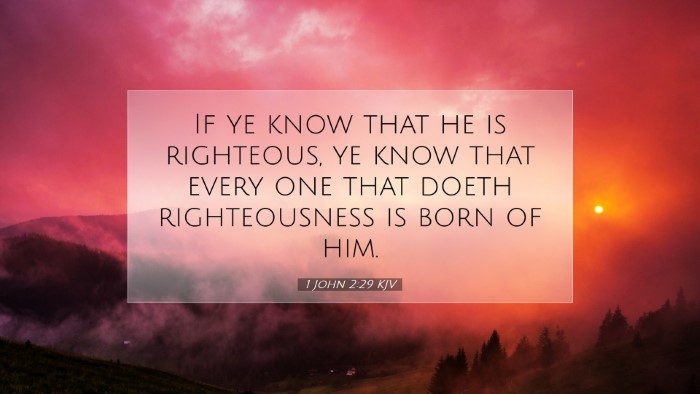Commentary on 1 John 2:29
Verse: "If you know that He is righteous, you know that everyone who practices righteousness is born of Him."
This verse captures the essence of John's teaching about the nature of true believers in Christ and their identity as children of God. In this commentary, we will explore the implications of this verse through insights gathered from renowned public domain commentators such as Matthew Henry, Albert Barnes, and Adam Clarke.
Understanding Righteousness
Matthew Henry emphasizes the foundational belief that the righteousness of God is pivotal for understanding the behavior of believers. He notes that understanding God's righteousness is not merely an intellectual exercise; it requires acknowledgment that God's nature is perfectly just, and that such justice is manifest in the lives of His children.
Albert Barnes adds that righteousness in this context refers to both the intrinsic righteousness of God and the ethical conduct expected of those who areHis followers. To recognize God as righteous is to see Him as the ultimate standard of morality and justice. This acknowledgment should naturally lead believers to exhibit similar traits in their lives.
Practicing Righteousness
John connects the knowledge of God's righteousness to the practice of righteousness among believers. Adam Clarke elucidates that the phrase "everyone who practices righteousness" is not limited to a few moral acts; rather, it embodies a lifestyle of righteousness that advocates justice, truth, and love. Clarke stresses the continuous action implied by the word "practices," which denotes an ongoing commitment to living in accordance with God's will.
- Importance of Righteous Living: The intrinsic link between knowing God and living righteously underscores the transformative nature of faith. True knowledge of God manifests itself in the believer's actions.
- Evidence of New Birth: John suggests that those who practice righteousness provide evidence of their new birth in Christ. This new identity is characterized by attitudes and actions that reflect God's righteousness.
The Nature of Being Born of Him
Matthew Henry also notes that being "born of Him," refers to the spiritual rebirth that believers undergo when they accept Christ. This rebirth equips them with a new nature that aligns their desires with God's will, thus their inclination towards righteousness is not self-generated but a divine work.
Albert Barnes comments that this divine birth signifies a relationship akin to children and parents, wherein God imparts His nature to believers. This familial relationship illustrates that just as children typically emulate their parents, so too should Christians reflect the character of their Heavenly Father.
The Assurance of Salvation
This verse serves as both a challenge and an assurance for believers. Adam Clarke notes that acknowledging the righteousness of God and exhibiting righteousness in one’s life provides genuine assurance of salvation. The presence of righteousness in a believer’s life is a testament to their new identity and the work of the Holy Spirit.
Matthew Henry also emphasizes the comforting truth that our understanding of God’s righteousness should instill confidence in our faith journey. He encourages the believer that even when facing struggles with sin, one should not despair; as the practice of righteousness is indicative of the ongoing sanctification process initiated by God's grace.
Final Reflections
In conclusion, 1 John 2:29 invites deep reflection on the relationship between knowing God's righteousness and the manifestation of that knowledge in righteous living. The central message articulates that true believers are called to embody the very attributes of God as a reflection of their new birth.
As pastors, students, and theologians engage with this text, they are reminded of the significance of living righteously as evidence of genuine faith. It calls for a holistic understanding that our assurance of salvation is intertwined with our commitment to reflect Christ in our daily lives.
This exploration of 1 John 2:29 exemplifies the profound connection between theology and praxis, urging the faithful not only to grasp the truth of God's character but to live it out in the world, thereby glorifying the Father through their works.


